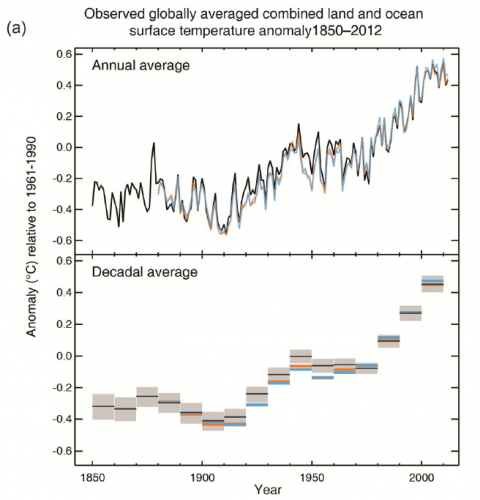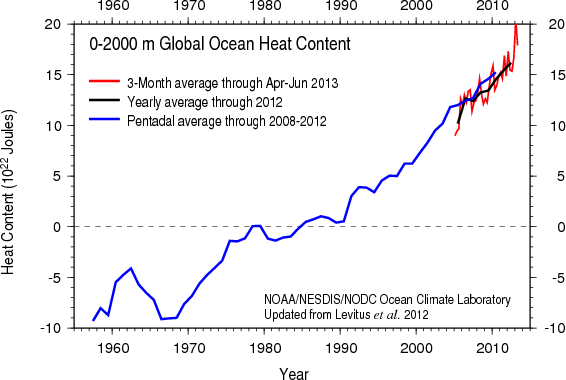In the long run, sea-level rise will be one of the most serious consequences of global warming. But how fast will sea levels rise? Model simulations are still associated with considerable uncertainty – too complex and varied are the processes that contribute to the increase. A just-published survey of 90 sea-level experts from 18 countries now reveals what amount of sea-level rise the wider expert community expects. With successful, strong mitigation measures, the experts expect a likely rise of 40-60 cm in this century and 60-100 cm by the year 2300. With unmitigated warming, however, the likely range is 70-120 cm by 2100 and two to three meters by the year 2300.
[Read more…] about Sea-level rise: What the experts expect
Oceans
Sea level in the 5th IPCC report
What is happening to sea levels? That was perhaps the most controversial issue in the 4th IPCC report of 2007. The new report of the Intergovernmental Panel on Climate Change is out now, and here I will discuss what IPCC has to say about sea-level rise (as I did here after the 4th report).
Let us jump straight in with the following graph which nicely sums up the key findings about past and future sea-level rise: (1) global sea level is rising, (2) this rise has accelerated since pre-industrial times and (3) it will accelerate further in this century. The projections for the future are much higher and more credible than those in the 4th report but possibly still a bit conservative, as we will discuss in more detail below. For high emissions IPCC now predicts a global rise by 52-98 cm by the year 2100, which would threaten the survival of coastal cities and entire island nations. But even with aggressive emissions reductions, a rise by 28-61 cm is predicted. Even under this highly optimistic scenario we might see over half a meter of sea-level rise, with serious impacts on many coastal areas, including coastal erosion and a greatly increased risk of flooding.
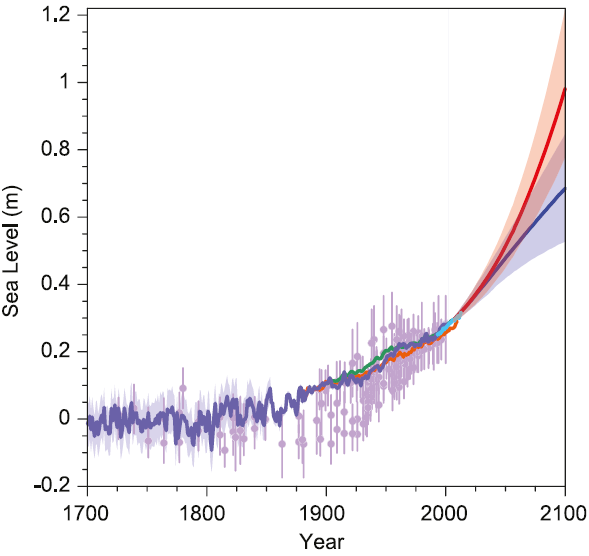
Fig. 1. Past and future sea-level rise. For the past, proxy data are shown in light purple and tide gauge data in blue. For the future, the IPCC projections for very high emissions (red, RCP8.5 scenario) and very low emissions (blue, RCP2.6 scenario) are shown. Source: IPCC AR5 Fig. 13.27.
[Read more…] about Sea level in the 5th IPCC report
The new IPCC climate report
The time has come: the new IPCC report is here! After several years of work by over 800 scientists from around the world, and after days of extensive discussion at the IPCC plenary meeting in Stockholm, the Summary for Policymakers was formally adopted at 5 o’clock this morning. Congratulations to all the colleagues who were there and worked night shifts. The full text of the report will be available online beginning of next week. Realclimate summarizes the key findings and shows the most interesting graphs.
Update 29 Sept: Full (un-copyedited) report available here.
Global warming
It is now considered even more certain (> 95%) that human influence has been the dominant cause of the observed warming since the mid-20th century. Natural internal variability and natural external forcings (eg the sun) have contributed virtually nothing to the warming since 1950 – the share of these factors was narrowed down by IPCC to ± 0.1 degrees. The measured temperature evolution is shown in the following graph.
Figure 1 The measured global temperature curve from several data sets. Top: annual values. Bottom: averaged values over a decade.
[Read more…] about The new IPCC climate report
What ocean heating reveals about global warming
The heat content of the oceans is growing and growing. That means that the greenhouse effect has not taken a pause and the cold sun is not noticeably slowing global warming.
NOAA posts regularly updated measurements of the amount of heat stored in the bulk of the oceans. For the upper 2000 m (deeper than that not much happens) it looks like this:
Change in the heat content in the upper 2000 m of the world’s oceans. Source: NOAA
[Read more…] about What ocean heating reveals about global warming
The answer is blowing in the wind: The warming went into the deep end
There has been an unusual surge of interest in the climate sensitivity based on the last decade’s worth of temperature measurements, and a lengthy story in the Economist tries to argue that the climate sensitivity may be lower than previously estimated. I think its conclusion is somewhat misguided because it missed some important pieces of information (also see skepticalscience’s take on this story here).
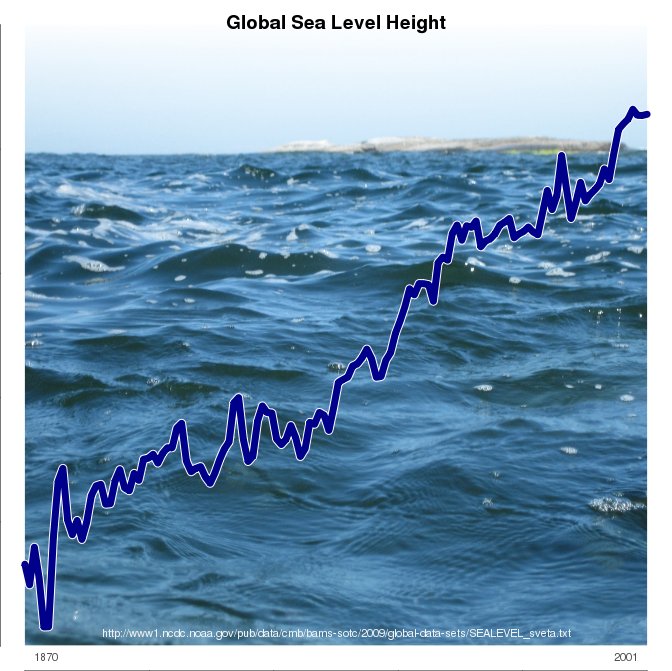
While the Economist referred to some unpublished work, it missed a new paper by Balmaseda et al. (2013) which provides a more in-depth insight. Balmaseda et al suggest that the recent years may not have much effect on the climate sensitivity after all, and according to their analysis, it is the winds blowing over the oceans that may be responsible for the ‘slow-down’ presented in the Economist.
[Read more…] about The answer is blowing in the wind: The warming went into the deep end
References
- M.A. Balmaseda, K.E. Trenberth, and E. Källén, "Distinctive climate signals in reanalysis of global ocean heat content", Geophysical Research Letters, vol. 40, pp. 1754-1759, 2013. http://dx.doi.org/10.1002/grl.50382
Ice hockey
Eric Steig
It is well known that ice shelves on the Antarctic Peninsula have collapsed on several occasions in the last couple of decades, that ice shelves in West Antarctica are thinning rapidly, and that the large outlet glaciers that drain the West Antarctic ice sheet (WAIS) are accelerating. The rapid drainage of the WAIS into the ocean is a major contributor to sea level rise (around 10% of the total, at the moment).
All of these observations match the response, predicted in the late 1970s by glaciologist John Mercer, of the Antarctic to anthropogenic global warming. As such, they are frequently taken as harbingers of greater future sea level rise to come. Are they?
Two papers published this week in Nature Geoscience provide new information that helps to address this question. One of the studies (led by me) says “probably”, while another (Abram et al.) gives a more definitive “yes”. [Read more…] about Ice hockey
Sea-level rise: Where we stand at the start of 2013 — Part 2
This is Part 2 of my thoughts on the state of sea-level research. Here is Part 1.
Sea-level cycles?
A topic that keeps coming up in the literature is the discussion on a (roughly) 60-year cycle in sea level data; a nice recent paper on this is Chambers et al. in GRL (2012). One thing I like about this paper is its careful discussion of the sampling issue of the tide gauges, which means that variability in the tide gauges is not necessarily variability in the true global mean sea level (see Part 1 of this post). I want to add some thoughts on the interpretation of this variability. Consider this graph from my Response to Comments in Science (2007):
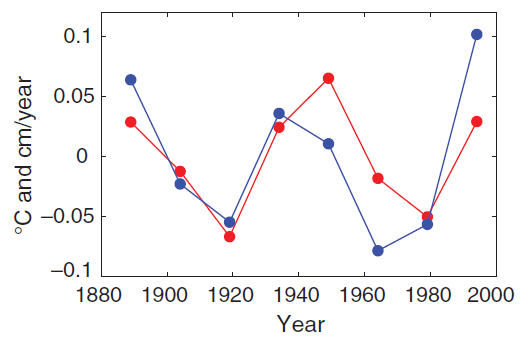
Fig. 1: Fifteen-year averages of the global mean temperature (blue, °C, GISS data) and rate of sea level rise (red, cm/year, Church&white data), both detrended.
[Read more…] about Sea-level rise: Where we stand at the start of 2013 — Part 2
References
- D.P. Chambers, M.A. Merrifield, and R.S. Nerem, "Is there a 60‐year oscillation in global mean sea level?", Geophysical Research Letters, vol. 39, 2012. http://dx.doi.org/10.1029/2012GL052885
- S. Rahmstorf, "Response to Comments on "A Semi-Empirical Approach to Projecting Future Sea-Level Rise"", Science, vol. 317, pp. 1866-1866, 2007. http://dx.doi.org/10.1126/science.1141283
Sea-level rise: Where we stand at the start of 2013
Progress has been made in recent years in understanding the observed past sea-level rise. As a result, process-based projections of future sea-level rise have become dramatically higher and are now closer to semi-empirical projections. However, process-based models still underestimate past sea-level rise, and they still project a smaller rise than semi-empirical models.
Sea-level projections were probably the most controversial aspect of the 4th IPCC report, published in 2007. As an author of the paleoclimate chapter, I was involved in some of the sea-level discussions during preparation of the report, but I was not part of the writing team for the projections. At the core of the controversy were the IPCC-projections which are based on process models (i.e. models that aim to simulate individual processes like thermal expansion or glacier melt). Many scientists felt that these models were not mature and understated the sea-level rise to be expected in future, and the IPCC report itself documented the fact that the models seriously underestimated past sea-level rise. (See our in-depth discussion published after the 4th IPCC report appeared.) That was confirmed again with the most recent data in Rahmstorf et al. 2012.
[Read more…] about Sea-level rise: Where we stand at the start of 2013
References
- S. Rahmstorf, G. Foster, and A. Cazenave, "Comparing climate projections to observations up to 2011", Environmental Research Letters, vol. 7, pp. 044035, 2012. http://dx.doi.org/10.1088/1748-9326/7/4/044035
Don’t estimate acceleration by fitting a quadratic…
… if your data do not look like a quadratic!
This is a post about global sea-level rise, but I put that message up front so that you’ve got it even if you don’t read any further.
The reputable climate-statistics blogger Tamino, who is a professional statistician in real life and has published a couple of posts on this topic, puts it bluntly:
Fitting a quadratic to test for change in the rate of sea-level rise is a fool’s errand.
I’d like to explain why, with the help of a simple example. Imagine your rate of sea-level rise changes over 100 years in the following way:
[Read more…] about Don’t estimate acceleration by fitting a quadratic…
A sea level Golden Horseshoe nominee*
I was reading a sign high on the wall behind the bar:
‘Only genuine pre-war British and American whiskeys served here’
I was trying to count how many lies could be found in those nine words, and had reached four, with promise of more …”
Dashiell Hammett, “The Golden Horseshoe”
Google News occasionally throws up some obscure postings that I would never otherwise come across. A recent example was a letter to an editor of a Scottish newspaper (not my usual reading material) declaring that “Climate change is not man-made”. The letter itself is uninteresting – a basic confusion between weather and climate seguing into a NIMBY-ish rant about windmills. Ho hum.
However, in one of the comments from a “Dr John Cameron, St Andrews” (posted 9/Oct/2012), there was this unrelated pseudo-factoid:
As regards the catastrophic sea level rise in the Pacific, it became obvious some 20 years ago that results from island tide gauges did not support computer predictions. Scientists from Flinders University in Adelaide set up new, modern, tide-gauges in 12 Pacific islands to test whether there was in fact any evidence of sinking. Recently the whole project was abandoned as there had been no sign whatsoever of a change in sea level at any of the 12 islands for the past 16 years.
Now this is specific enough to probably actually refer to something real, but doesn’t pass the sniff test for something that might actually be true. Scientists don’t set up monitoring stations only to get the answer they want and then stop monitoring if it doesn’t happen. This only happens in the fevered imaginations of conspiracy theorists. So I was intrigued enough to investigate what this actually referred to…
[Read more…] about A sea level Golden Horseshoe nominee*
